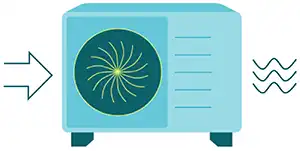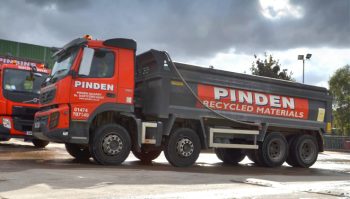Background
Family-owned waste management company, Pinden Limited, prides itself on being an innovative operation. The firm has been servicing businesses and households across Kent and the South East since 1973 and, as part of the community, is invested in helping to improve the local surroundings.
Always looking for ways to lessen the potential impact of its day-to-day activities, recent initiatives have included the installation of semi-automated picking lines for more accurate waste separation and upgrading its fleet of trucks and tippers. The upshot is a modern, efficient, and effective recycling service that is believed to be the most sophisticated set-up of its kind, among the UK’s independent waste sector.
Reflective of its committed environmental stance, Pinden is an accredited partner of the circular economy and resource efficiency charity, WRAP (Waste and Resources Action Program). Its participation in the FORS (fleet operator recognition scheme) also means the company has to demonstrate year-on-year improvement in the management of its emissions.
With an on-road fleet of 18 vans and 64 HGVs, ranging from 3 tonne to 66 tonne arctic trucks, fuel choice is integral to the business’ bottom line and its positioning as a sustainability leader. Since the Renewable Transport Fuel Obligation (RTFO) came into force in 2019, the increased percentage of bio content in diesel has contributed to reducing greenhouse gas emissions but has inadvertently caused a number of technical issues pertaining to fuel contamination problems.
The Challenge
As well as running a large fleet of on road vehicles, Pinden’s off road machinery includes loaders, excavators and crushers. Significant disruption was being seen across the entire suite at its Dartford depot. Repeated incidents of clogging and sludge build-up in filters was taking too many vehicles out of use and costing Pinden time and money, as well as putting their hard-earned reputation at risk. Despite having state-of-the art facilities the plant’s performance was being jeopardised by a very modern problem: FAME.
FAME (fatty acid methyl esters) is found in biofuels made from recycled cooking oils, plant-based material and other renewables such as animal fats and plant oils. It has commonly been blended into UK road fuel since 2004 but with the new RTFO coming into effect, many businesses have been using supplies with a higher bio content in order to meet increasing targets, directing the percentage of fuel volume supplied from sustainable and renewable sources.
Like so many of these organisations, Pinden started to encounter issues arising from this FAME content. The continuous blocking of filters with a slimy substance was being caused by diesel bug infestation. This occurs because of the increased risk of water contamination (FAME is hygroscopic in nature, meaning it more readily absorbs water). When blockages occur it can lead to irregular fuel performance or fuel starvation in engines.
To try and resolve the filter problem, Pinden used an additive solution as a stop gap. ‘Anti-bug’ additives can be dosed into fuel to fix a live infestation, or as a continuous maintenance measure to prevent future microbiological contamination. There are other additives available to tackle a broader range of issues relating to water pick-up – helping to counteract the reduced sulphur content and also preventing waxing and fuel separation, for example.
But having to manually mix in the additives became a notable and time-consuming operation in itself so Pinden sought another solution with guidance from the Certas Energy Account Management team.
The solution
Certas Energy had consulted some months prior to help identify that the problems Pinden had been experiencing were, in fact, down to the increased bio content in their fuel supply. At that time, Certas Energy introduced an alternative, FAME-free way forward in cleaner burning diesel alternative, GTL Fuel. An alternative fuel that burns cleaner than conventional crude-oil based diesel fuels and contains zero bio content. What’s more, it offers a more convenient ‘drop-in’ solution and involves far less complex maintenance requirements.
“Using biofuel additives, represented a less costly upfront solution, on the face of it, and we persevered for a time. But with building costs due to operational downtime, filter replacements, frequent maintenance and forced regenerations of the diesel particulate filters (DPFs) we looked again at the alternative fuel proposal. Taking a medium to longer term view it became clear that the initial outlay would be balanced out against the associated costs of continuing with the same regime”
Tom Clubb, Transport Manager at Pinden
Now, two months down the line, Pinden is benefiting from a more practical and responsible fuel choice, with Certas Energy. The Gas-To-Liquid fuel will not only contribute to wider environmental goals and its FORS Silver status, but will also support Pinden in improving the local surroundings – a central pillar of Pinden’s values.
Proven to reduce harmful emissions of nitrogen oxides (NOx) and particulate matter (PM) by up to 30% and 50% respectively, GTL Fuel is being successfully used as part of a wider strategy to improve local air quality across the country and Pinden’s adoption cements its claim to being an environmental leader in the waste and resource management category.
If you would like discuss the benefits of cleaner burning alternative fuels, contact your Account Manager directly or place an enquiry online below.







